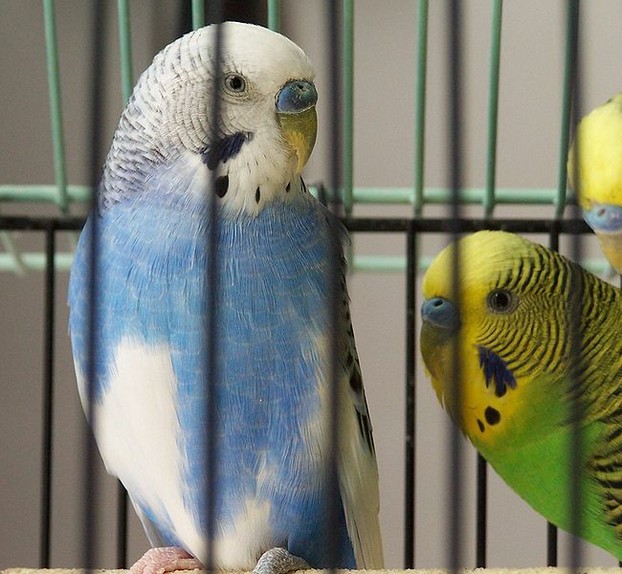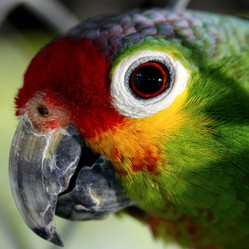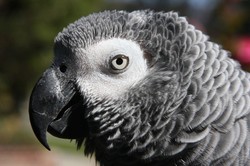Want your pet bird to stay healthy? Then you should know how to identify the common parakeet illness symptoms. These birds are generally quite resilient and rarely fall ill and a balanced diet, optimal temperature, and clean air in the room can help in ensuring they do not fall sick at all. However, there are various diseases that can afflict these birds including mites, parasitic infestations, nutritional deficiencies, candidiasis, viruses, and even chlamydia. Here are some of the common signs of a sick parakeet.

A Look at the Common Parakeet Illness Symptoms
by Roohi
Most bird owners do not know anything about identifying a sick parakeet. Find out about the common parakeet illness symptoms and what you can do about it.
Changes in Behavior
Behavioral changes are the most common way to identify a sick parakeet. You will notice that the bird loses interest in most things that he or she usually likes. He will not be interested in playing with you or with his toys. Catching him will become easier than usual. He will also have problems maintaining his balance on the perch.
Changes in appetite are also signs of a sick parakeet. He won't be interested in eating anything or will be eating lesser than usual. You may notice that the area around his beak is dirty indicating that he has been throwing up.
 Watch out for a sick parakeet |
Changes in Appearance
Another common sign of parakeet illness is a change in the appearance of the bird. A sick parakeet will look all fluffed up and will have his eyes closed. You will notice that he tends to bury his head into his feathers.
You will also not find him standing as usual or perching on his perch. In fact, he will either be sitting down or lying down and his tail will be hanging down rather than upright. Discharges from the eyes or nose are also signs that you should watch out for.
Excrement
The droppings of the bird are another thing that you should look at. Mucus-like droppings that look watery and red or green in color may be a sign that your bird is not feeling well.
Other Signs of Parakeet Illness
A sick parakeet may breathe heavily with his beak constantly open. You may find your bird sneezing or wheezing (breathing with a whistling sound). Rapid breathing is another sign that he is having difficulties in breathing.
Standing with his legs wide apart and beak open indicates that he is experiencing some sort of pain. Too many feathers falling around could be a sign of parakeet molting or it could be a sign of illness. Swellings in different parts of the body are also things that you should watch out for.
What to do if you Notice These Common Signs of Parakeet Illness
It is necessary that you watch out for the above mentioned parakeet illness symptoms since ignoring these can cause the death of your beloved bird. If you notice any of these common signs of parakeet illness, separate the bird from the others and keep a watch on the temperature of your pet. His temperature will be lower than the normal 105 to 108.5 degrees Fahrenheit. Place the bird in a warm environment and maintain hygiene as much as possible.
You can place clean paper towels in his cage and change them several times in the day for maintaining proper hygiene. Of course, take your sick parakeet to the vet as soon as possible so that he can get immediate treatment and relief from his pain and discomfort.
More Information on Parrot Care
You might also like
Interesting Facts about African Grey ParrotsAre you looking for information on African Grey behavior? Then you have come ...
Interesting Facts about the European Shorthair CatAre you thinking of buying a house cat? Why not get a European shorthair cat ...












 Tips to reduce computer eye strainon 03/23/2013
Tips to reduce computer eye strainon 03/23/2013
 Why Can't I Sleep at Night?on 03/14/2013
Why Can't I Sleep at Night?on 03/14/2013
 What is a Birthstone and what is my Birthstone?on 12/03/2012
What is a Birthstone and what is my Birthstone?on 12/03/2012
 Beautiful Flower Jewelryon 12/02/2012
Beautiful Flower Jewelryon 12/02/2012



Comments
You are indeed talking from experience, Tolovaj. Once you get to know your bird, you can easily know when it is sick. It is definitely a huge responsibility. And I agree, people should read as much as possible about taking care of birds, or for that matter any pet. This ensures that the pet lives a long and healthy life. Thanks for sharing your thoughts!
We had parakeets when I was a small child and canaries later. It is not hard to spot when something is wrong with a bird when you know it, but much harder for a new owner. I remember all birds with problems had untidy feathers and they also moved different than when they were o.k.
Anyway, having a pet is always a responsibility and reading a book or two and talking with experienced owner before buying a pet is probably best investment in this field...